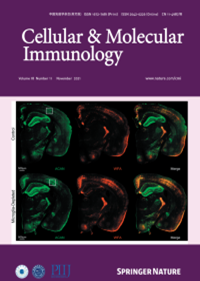GLP1 alleviates oleic acid-propelled lipocalin-2 generation by tumor-infiltrating CD8+ T cells to reduce polymorphonuclear MDSC recruitment and enhances viral immunotherapy in pancreatic cancer
IF 19.8
1区 医学
Q1 IMMUNOLOGY
引用次数: 0
Abstract
Recruitment of polymorphonuclear MDSCs (PMN-MDSCs) in the TME suppresses the antitumor activity of tumor-infiltrating CD8+ T cells (CD8+ TILs). Little is known about the role of antitumoral CD8+ TILs in actively initiating an immune-tolerant microenvironment, particularly in the recruitment of PMN-MDSCs. In this study, we found that immunotherapy-activated CD8+ TILs significantly increased PNM-MDSC infiltration in the TME, resulting in antitumor resistance. When CD8+ T cells are activated, lipocalin-2 (LCN2) expression is strongly upregulated, which significantly enhances PMN-MDSC chemotaxis. Mechanistically, immune activation increased fatty acid synthesis in CD8+ T cells, particularly oleic acid (OA), which induced lysosomal membrane permeabilization, releasing cathepsin B and subsequently activating NF-κB to promote LCN2 expression. Moreover, we showed that glucagon-like peptide 1 (GLP1) effectively inhibited OA synthesis in activated CD8+ T cells, reducing LCN2 production. We then developed a recombinant adenovirus encoding GLP1 (AdV-GLP1), which significantly reduced PMN-MDSC infiltration and reinvigorated the antitumor activity of CD8+ TILs. In various pancreatic cancer models, including subcutaneous, orthotopic, and humanized CDX/PDX models, AdV-GLP1 displayed excellent antitumor efficacy. Our work advances the understanding of how immunotherapy-activated CD8+ TILs initiate PMN-MDSC infiltration and provides a clinically relevant strategy to target this interaction and improve cancer immunotherapy.

GLP1减轻肿瘤浸润性CD8+ T细胞产生油酸驱动的脂载素-2,减少多形核MDSC募集,增强胰腺癌的病毒免疫治疗。
在TME中募集多形核MDSCs (PMN-MDSCs)可抑制肿瘤浸润性CD8+ T细胞(CD8+ TILs)的抗肿瘤活性。关于抗肿瘤CD8+ TILs在主动启动免疫耐受微环境中的作用,特别是在PMN-MDSCs的募集中,所知甚少。在本研究中,我们发现免疫治疗激活的CD8+ TILs显著增加了PNM-MDSC在TME中的浸润,导致抗肿瘤抵抗。当CD8+ T细胞被激活时,脂载素-2 (lipocalin-2, LCN2)表达强烈上调,显著增强PMN-MDSC趋化性。机制上,免疫激活增加了CD8+ T细胞中脂肪酸的合成,尤其是油酸(OA),它诱导溶酶体膜渗透,释放组织蛋白酶B,随后激活NF-κB,促进LCN2的表达。此外,我们发现胰高血糖素样肽1 (GLP1)有效抑制活化CD8+ T细胞的OA合成,减少LCN2的产生。然后,我们开发了一种编码GLP1的重组腺病毒(AdV-GLP1),该病毒显著减少了PMN-MDSC的浸润,并重新激活了CD8+ TILs的抗肿瘤活性。在各种胰腺癌模型中,包括皮下、原位和人源化CDX/PDX模型,AdV-GLP1显示出优异的抗肿瘤疗效。我们的工作促进了对免疫治疗激活的CD8+ TILs如何启动PMN-MDSC浸润的理解,并提供了临床相关的策略来靶向这种相互作用并改善癌症免疫治疗。
本文章由计算机程序翻译,如有差异,请以英文原文为准。
求助全文
约1分钟内获得全文
求助全文
来源期刊
CiteScore
31.20
自引率
1.20%
发文量
903
审稿时长
1 months
期刊介绍:
Cellular & Molecular Immunology, a monthly journal from the Chinese Society of Immunology and the University of Science and Technology of China, serves as a comprehensive platform covering both basic immunology research and clinical applications. The journal publishes a variety of article types, including Articles, Review Articles, Mini Reviews, and Short Communications, focusing on diverse aspects of cellular and molecular immunology.

 求助内容:
求助内容: 应助结果提醒方式:
应助结果提醒方式:


